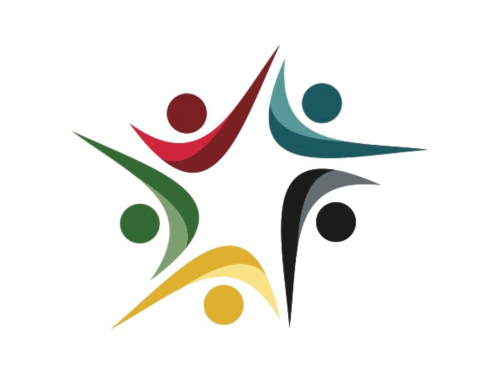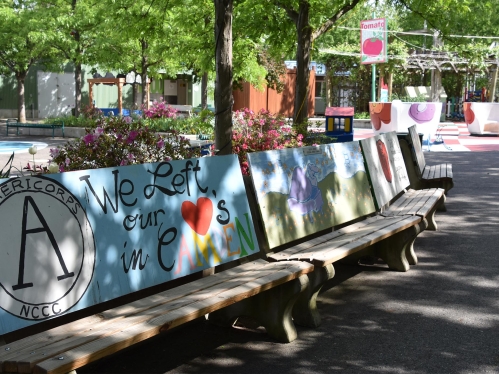Grants
Community-Academic Grants Program

The Rutgers Equity Alliance for Community Health (REACH) is designed to improve health outcomes in economically disadvantaged communities by addressing social determinants of health. REACH's work focuses on five social determinants of health: education, employment, food access and food security, housing and population health in three New Jersey cities: Camden, New Brunswick and Newark. REACH is a university-wide effort designed to bring all four chancellor-led units together to address health and socioeconomic inequities through academic-community partnerships.
The purpose of REACH’s grant funding is to put research into practice by working in partnership with community residents and leaders on new approaches to bring about long-lasting systemic change and achieve health equity by addressing issues of inequity that include structural and systemic racism impacting all five of our social determinant focus areas. REACH is designed to support Rutgers faculty, students and staff to engage in equitable, longitudinal and sustainable community-based scholarship
The REACH Community-Academic Grants Program comprises two funding categories:
Community Impact Grants
Community Impact Grants will fund projects focused on positively impacting the community in a demonstrable way through an evidence-based strategy for change. These projects are not required to have a research focus or lead to subsequent research funding.
The impetus for this funding category is two-fold:
1) to incentivize translation of research and/or replication of community-identified successful operations into practice and
2) to serve as a mechanism to provide bridge funding for continuity of community engagement projects that positively impact socioeconomic and health outcomes. For example, these grants may support ongoing community-based work that emerged in an effective research project developed in partnership with community that is unable to be sustained when current grant funding ends. These funds may also be used to pilot the integration of learners into community-engaged service and/or scholarship with an expectation that such engagement can be maintained once the grant funding ends. It should be noted that all Community Impact Grants must include an evaluation component and plans for sustainability should be outlined.

Research Seed Grants
Research Seed Grants will fund projects that have the potential to advance knowledge and identify new evidence-based strategies for improvement in one of the five social determinants. These projects are required to have a clear research focus that will lead to ongoing research funding.
The impetus for this funding category is two-fold:
1) to incentivize faculty to further develop community partnerships to inform their research direction and
2) to provide funding for the collection of preliminary data and results that will make future grant applications to other funders more successful. Where appropriate, these grants can be used to fund community-based participatory research projects that focus on one of the five identified social determinants in one of the three key cities. REACH funding is not intended primarily for research purposes. Research Seed Grants are therefore intended to seed community-based research projects designed to answer questions focused on one or more of our five social determinants of health to inform action to achieve long-lasting systemic change.
In both funding categories, grants will only be awarded for projects that align community members, organizations, and Rutgers faculty or staff in a long-term collaborative alliance. It is anticipated that approximately 80% of REACH funding will be awarded as Community Impact Grants, and 20% will fund Research Seed Grants. Applicants will be required to specify the type of funding for which they are applying.

FAQ
-
All applications must be submitted online.
The following elements will comprise a complete packet and are available on the InfoReady application site:
-
Applicant Information
-
Proposal type: Community Impact Grant vs. Research Seed Grant
-
Proposal abstract: Brief description of the overall project, not to exceed 500 words.
-
Proposal narrative: Not to exceed five pages, including any figures or tables. No appendix materials will be accepted.
-
Proposed budget: Anticipated budget for the project, including funding to be allocated to community partner(s).
-
Letter(s) of commitment from community partner(s): Required of all proposed community partners, describing their role in and commitment to the project.
-
Principal Investigator’s CV and CVs or resumés from identified project staff and community partners.
-
A clearly documented evaluation strategy with a determination of whether IRB approval will be required.
-
-
REACH funding is not intended primarily for research purposes.
-
At this time, there is not another grant cycle.
-
-
Project directors/principal investigators (PD/PI) must be full-time Rutgers employees.
-
Any Rutgers faculty/staff member is eligible to apply, provided they are engaged in an active, mutually generative partnership with a community-based organization working in one of REACH’s three targeted cities.
-
Proposals from full-time Rutgers staff must represent projects directly related to their roles and work within the University.
-
All proposed projects must be a partnership between the indicated Rutgers PD/PI and at least one community-based organization.
-
As part of the proposal submission, community partner representatives must endorse the proposal and attest to their role in the formation and implementation of the project, and outline the anticipated outcomes and impact on local systems.
-
Community-based organizations must be tax-exempt under Section 501(c)(3) of the Internal Revenue Code and not private foundations or nonfunctionally integrated Type III supporting organizations.
-
Examples of partner organizations include, but are not limited to: faith-based organizations, community-based organizations, local health and human service agencies; K–12 schools, hospital systems, local government, government agencies or departments, nonprofits, or other eligible entities interested in making an impact in their communities around SDOH. While the grant recipient will be a Rutgers faculty/staff member, grant funding is intended to support the strategies and work of the proposed project, including the community partner(s).
-
All applications must focus on projects based in Camden, New Brunswick or Newark. While community partners may be based outside of these three cities, the work to be done must be focused on these three cities alone.
-
All applications must be focused on one of the five focus areas of housing, employment, food access and security, population health, or education.
-
-
The Rutgers Office for Research has several new tools and resources for determining if the proposed project is considered “Human Subject Research” and requires IRB approval, including:
- CIRTification Training - The CIRTification: Community Involvement in Research Training is a human research protections training program designed especially for individuals in community organizations. If you will be involved in human subjects research and will be working with individuals in community organizations who will be responsible for recruiting research participants, obtaining informed consent, or collecting data, then this training is for your individual partners at each community organization(s) site.
- Draft Services - DRAFT Services (formerly known as Pre-Review Service) stands for "Document Revision And Feedback Team". The mission of the DRAFT Service is to improve submission outcomes by recommending and educating study teams on HRPP/IRB considerations and best practices. It is highly recommended that the DRAFT Service is used by investigators prior to submitting new studies or substantial modifications to existing studies in eIRB.
-
IRB Review Type and Template Recommendation Tool - asks a series of questions to provide investigators with recommendations on which protocol and consent templates to use based on the type of research indicated.
Should the proposed project require IRB approval, notice of approval will be required prior to the release of funding. It is not required at the time of application.
- CIRTification Training - The CIRTification: Community Involvement in Research Training is a human research protections training program designed especially for individuals in community organizations. If you will be involved in human subjects research and will be working with individuals in community organizations who will be responsible for recruiting research participants, obtaining informed consent, or collecting data, then this training is for your individual partners at each community organization(s) site.
-
- Community based organizations/community partners cannot be a Rutgers entity and for purposes of this project, their work must be based in Camden, Newark, or New Brunswick.
- Community-based organizations must be tax-exempt under Section 501(c)(3) of the Internal Revenue Code and not private foundations.
- Examples of partner organizations include, but are not limited to: faith-based organizations, community-based organizations, local health and human service agencies; K–12 schools, hospital systems, local government, government agencies or departments, nonprofits, or other eligible entities interested in making an impact in their communities around SDOH.
- Community based organizations/community partners cannot be a Rutgers entity and for purposes of this project, their work must be based in Camden, Newark, or New Brunswick.
-
Yes, a minimum of 20% of the requested grant budget must be allocated to the identified community partners.
-
Yes. RU Personnel costs (including faculty, staff, and students working on the project) cannot exceed 20% of the proposed total budget. (There are no restrictions on the proportion of the community partner’s allocation that is budgeted for personnel.)
-
At this time, there is not another grant cycle.
-
Yes, anyone identified in the proposal narrative must provide a CV or resume. If neither is available, a letter signed from the partner will be considered.
-
Yes, grantees are eligible to reapply for future funding but not guaranteed awards.
-
That is not a priority. We are not looking for volume- we are looking for the right partners.
-
Eligible faculty and staff can only submit one proposal per person as the principal investigator.
-
Round 4 grants can have a duration of up to one year.
-
- A minimum of 20% of grant funds must be earmarked for the community partner(s). (There are no specific requirements for funding distribution within the community partner allocation.)
-
No more than 20% of the total budget request may be used to fund RU personnel costs. If there are students on the project and they are being paid as hourly workers, these funds will appear on the personnel tab of the budget template and will therefore count as a part of that 20% total.
-
No F&A is taken on these projects.
-
Fringe is taken according to employment classification; the appropriate rates are pre-loaded in the RU budget template provided on InfoReady.
-
All format requirements—length, font, budget specifications, etc.—are detailed within the application itself on InfoReady.
-
-
DRAFT Services IRB Office hours are held every Tuesday 1-1:30 and Thursday 10-10:30 via Zoom
-
Quick Guides provide step-by-step overviews of the eIRB+ application sections and provide tips, guidance, and screenshots to build comfort and familiarity. eIRB Quick Guides are available as PDFs.
-
Contact:
-
IRB general email: IRBOffice@research.rutgers.edu
-
Rutgers IRB DRAFT services email: IRBDRAFTservices@Research.rutgers.edu
-
-
-
We do not specify character or word limits for each section of the proposal narrative. Listed below are the percentages of weight for each section when they are scored by our reviewers, as that may be helpful to you in determining how much content to include in each section:
Background - 5%
Goals and Design - 20%
Team - 20%
Impact - 20%
Communications - 10%
Sustainability - 20%
Timeline - 5%